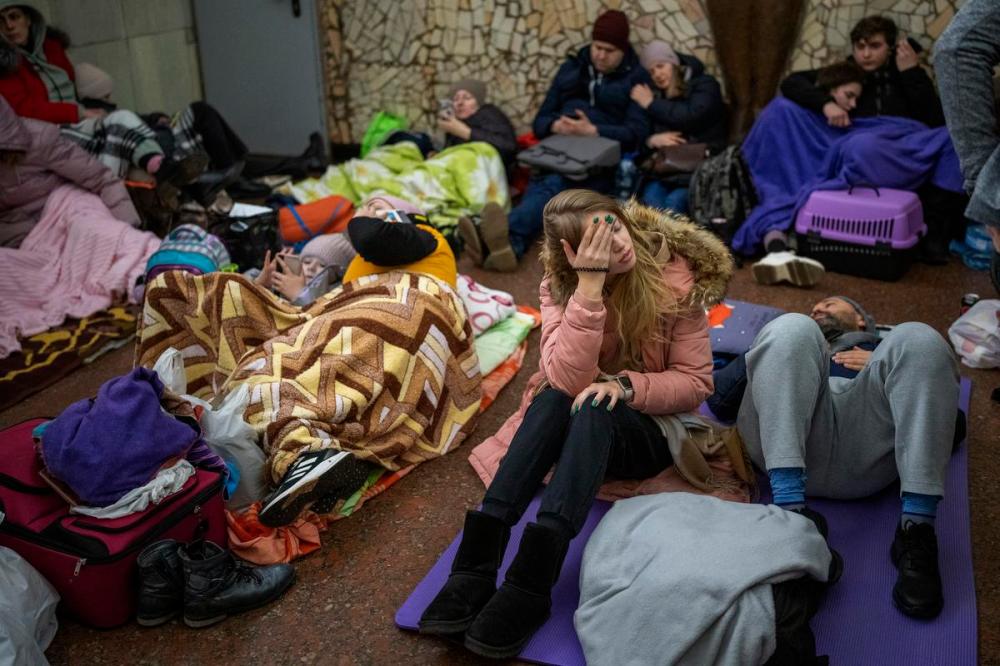10 predictions for Ukraine, now that Russia has invaded
Advertisement
Read this article for free:
or
Already have an account? Log in here »
To continue reading, please subscribe:
Monthly Digital Subscription
$0 for the first 4 weeks*
- Enjoy unlimited reading on winnipegfreepress.com
- Read the E-Edition, our digital replica newspaper
- Access News Break, our award-winning app
- Play interactive puzzles
*No charge for 4 weeks then price increases to the regular rate of $19.00 plus GST every four weeks. Offer available to new and qualified returning subscribers only. Cancel any time.
Monthly Digital Subscription
$4.75/week*
- Enjoy unlimited reading on winnipegfreepress.com
- Read the E-Edition, our digital replica newspaper
- Access News Break, our award-winning app
- Play interactive puzzles
*Billed as $19 plus GST every four weeks. Cancel any time.
To continue reading, please subscribe:
Add Free Press access to your Brandon Sun subscription for only an additional
$1 for the first 4 weeks*
*Your next subscription payment will increase by $1.00 and you will be charged $16.99 plus GST for four weeks. After four weeks, your payment will increase to $23.99 plus GST every four weeks.
Read unlimited articles for free today:
or
Already have an account? Log in here »
Hey there, time traveller!
This article was published 25/02/2022 (1387 days ago), so information in it may no longer be current.
Now that Russian President Vladimir Putin has invaded Ukraine and foreclosed his other options, certain aspects of the near future have become clear. So have some aspects of the longer run. Here are 10 predictions, made with varying degrees of confidence.
1. Ukraine’s organized military forces won’t be able to fight for long. Its armed forces are smaller and less well-equipped than the Russian invasion force, they are being attacked simultaneously from the north, east and south, and above all they lack air cover.
Russian cruise missiles have already struck most Ukrainian airbases and command centres, and Ukranian forces in the field will be cut up into small groups, surrounded and overwhelmed. Arming civilians won’t help; it will just get them killed. Organized combat will probably be over in a week, although fighting in the cities could last a little longer.

2. There will be an underground resistance movement at least for a while, but don’t imagine Ukrainians are going to be the new Viet Cong. This is an urban society, and the resistance will rely on ambushes, assassinations and IEDs. The Russians will call it “terrorism.”
3. Putin says “We do not intend to occupy Ukraine,” but of course Russia will. The only question is whether they will stop at Dnieper River (plus Kyiv, on the west bank), or take the western half of the country too.
Resistance will be stronger in the west, where Ukrainian nationalism has deeper roots. However, Putin’s denial of the legitimacy of the Ukrainian state — and indeed of a separate Ukrainian identity — means he can’t really leave the west out. The logic of his argument is that all the people on this “ancient Russian land” must be resubmerged in a greater Russian identity.
4. Russia’s civilian and military intelligence services, the FSB and GRU, will have lists of Ukrainians who are to be arrested: certainly thousands, maybe tens of thousands. Some of them may be killed, but we won’t hear about that if it happens. A lot more people who fear they might be on those lists will flee west.
5. Several hundred thousand other people will also flee west, just because they don’t want to live under military occupation and Russification. It could be more, if Russia leaves the border open for a while to get rid of the people who are likely to resent their presence most.
6. The border between NATO members and the countries Putin controls (Russia, Belarus and Ukraine) will be remilitarized, and defence budgets will rise in Germany and eastern European countries. However, as in Hungary in 1956 and Czechoslovakia in 1968, there will be no NATO military action to counter the Russian invasion of Ukraine. Why? Nuclear weapons.
7. Will a new cold war spread across the world? No, because post-Soviet Russia is too small and weak to hold up its end of it. Moreover, there is no real ideological conflict: democracy is an ideology, but dictatorship isn’t. At worst, there will be a “Cool War” in the North Atlantic/European region.
8. Will Putin get away with it? For a while, yes. There will be more Western sanctions against Russia, of course, but he has build up a big war chest (US$600 billion in reserves), and outside the big cities Russians are still very “patriotic” and pretty gullible. But Putin’s long-term project of re-Russification is foredoomed: there’s just no popular enthusiasm for it.
9. Will Ukraine regain its independence? Not while Putin is alive (he’s 69), unless there is a palace coup in the Kremlin. The Russians will install a puppet government in Kyiv, but will find it too unstable to let them bring their troops home again. When Putin is gone, however, Ukraine will have a chance to regain its freedom. So may Russia.
10. Will Donald Trump win the 2024 U.S. election? Maybe not. His fanboy adulation of Putin goes down well with the hardcore MAGA crowd, who admire the Russian dictator more than they do President Joe Biden — but praising Putin’s “smart move” in invading Ukraine will not play well with most Americans if their country is caught up in a confrontation with Russia.
Has the world “changed forever,” as the pundits love to say? No, of course not, but this is a very big deal, and a hell of a lot has changed.
Gwynne Dyer is a historian and independent journalist. His new book is “The Shortest History of War.”


